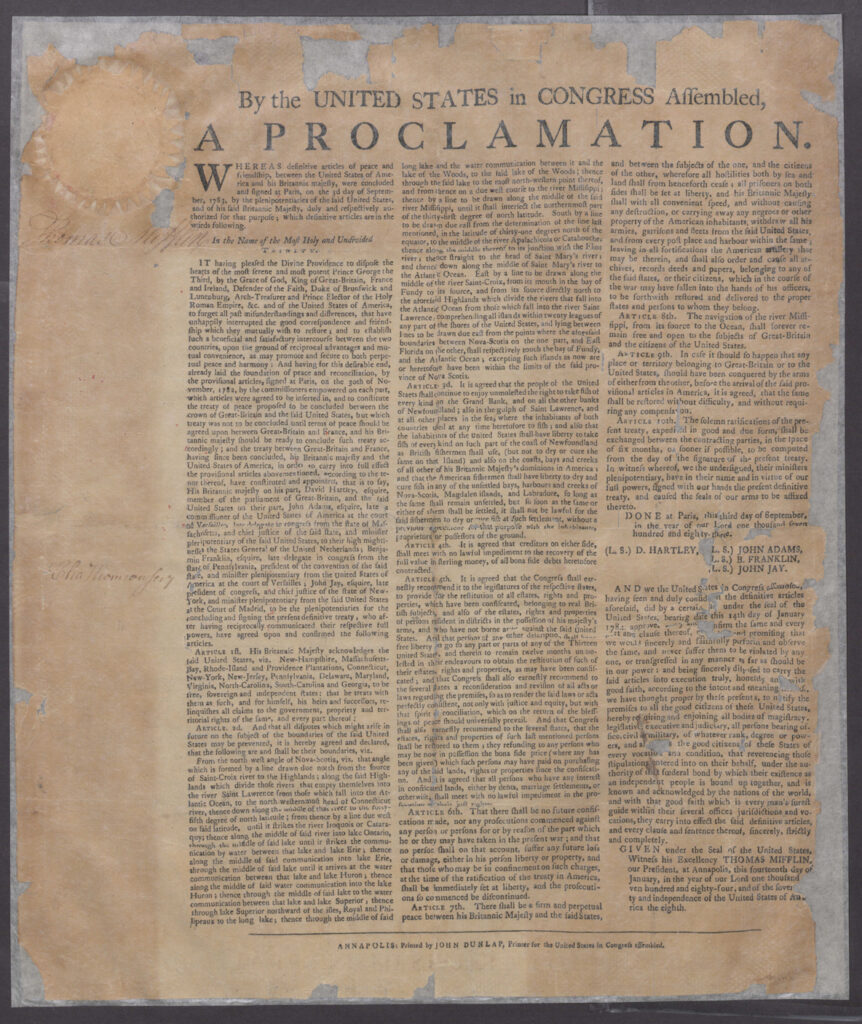November 30th, 1782, marks a pivotal day in world history – a day when representatives from the United States and Great Britain signed the preliminary peace articles in Paris, setting the stage for the formal end of the American Revolutionary War with the Treaty of Paris in 1783. This momentous event not only signaled the end of a grueling eight-year conflict but also marked the birth of a new nation on the global stage.
The Road to Paris
The American Revolutionary War, which began in 1775, was a fight for independence by the thirteen American colonies against British rule. The war was a complex and multifaceted conflict, involving not just American and British forces but also the strategic interests of European powers like France and Spain. The intervention of France in 1778 was crucial, turning what was essentially a colonial rebellion into a global conflict.
The Cast of Characters
The negotiations in Paris saw a cast of notable historical figures. The American delegation included Benjamin Franklin, John Adams, and John Jay. These men were not just political leaders but also astute diplomats. On the British side, the key negotiator was David Hartley, a Member of Parliament who was sympathetic to the American cause.
Negotiating Peace
The negotiations were far from straightforward. The British were initially reluctant to recognize American independence, while the Americans were divided on how much land they should claim and whether to honor pre-war debts to British creditors. Franklin, Adams, and Jay had to navigate not only British demands but also their instructions from Congress and their commitments to their French allies.
The Preliminary Articles
The preliminary articles signed on November 30th were significant for several reasons:
- Recognition of American Independence: Britain recognized the independence of the United States, a monumental achievement for the American colonies.
- Territorial Gains: The boundaries of the new nation were established, extending west to the Mississippi River, north to Canada, and south to Florida, which was returned to Spain.
- Fishing Rights: The treaty granted Americans fishing rights off the coast of Newfoundland and in the Gulf of Saint Lawrence.
- Treatment of Loyalists: The articles addressed the rights and properties of those who had remained loyal to the British Crown during the war.
- Debt and Prisoners: The agreement also covered the repayment of debts and the release of prisoners.

The Significance of the Treaty
The Treaty of Paris was more than just a peace agreement; it was a recognition of a shift in the global order. The emergence of the United States as an independent nation was a landmark in the history of democracy and national self-determination. It also signified the beginning of the decline of colonial empires in the Americas.
Reflections
The 1782 preliminary articles paved the way for the formal Treaty of Paris in 1783, officially ending the American Revolutionary War. This treaty was a testament to the perseverance, diplomacy, and vision of the founding fathers of the United States. It reminds us that the road to peace can be as complex and challenging as the path to war, requiring not just military might but also diplomatic skill and a vision for a better future.
As we reflect on this significant moment in history, it is essential to remember the values and ideals that drove the American Revolution and continue to shape democratic societies today. The Treaty of Paris stands as a powerful symbol of the struggle for independence, the complexities of international diplomacy, and the enduring quest for a more just and equitable world.







Susan
December 5, 2023 / at 6:47 pm
I love the historical background that you provide in these articles. Sadly, the leaders of our
country do not have the intelligence, nobility or commitment to our country as did these
noble leaders that formed our nation.